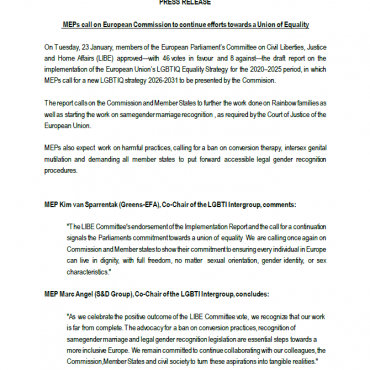Council LGBTI Conclusions are Trojan horse: legitimising homophobia
Last Thursday, the Council of the European Union adopted its conclusions on LGBTI equality. It is the first time ever that the Council adopts a document addressing LGBTI equality.
 An earlier attempt by the Council to reach Conclusions on LGBTI equality in December 2015 was blocked by Hungary.
An earlier attempt by the Council to reach Conclusions on LGBTI equality in December 2015 was blocked by Hungary.
In the document the Council asks the Commission to promote the measures outlined in its List of actions to advance LGBTI Equality.
Furthermore, the Council asks to report yearly on progress made under the list of actions.
However, the document creates a potentially harmful novelty by including that in its activities on LGBTI equality the Commission should “fully respect . . . Member States’ national identities and constitutional traditions.”
Arguments like this are typically used to stop progress in the protection of LGBTI people.
Ulrike Lunacek MEP, Co-President of the LGBTI Intergroup in the European Parliament, reacted: “I welcome that the Council has finally managed to reach some consensus in its support for the Commission’s list of actions on LGBTI equality. This list follows up on the European Parliament call for a Roadmap against homophobia and transphobia. I am also glad that it included a demand for a yearly report on the progress of the implementation of the actions.”
“However, the references to “national identities and constitutional traditions” are a Trojan horse which legitimises continued discrimination against LGBTI people.”
“LGBTI rights are human rights and should never be allowed to be negated by ‘tradition’ or ‘national identity’ arguments. I urge the Council to clarify its clear and unconditional support for the fundamental rights of LGBTIpeople.”
Sophie in ‘t Veld MEP, Vice-President of the LGBTI Intergroup, continued: “The reference to “national identities and constitutional traditions” are code language for “homophobia and discrimination are part of our identities and traditions, and we do not need to change them”. This is not an innocent phrase, but an implicit legitimation of existing discriminatory practices. ”
“Furthermore, the Council has failed to include certain important potential cards it holds in its own hands. Why did it not include its support for the proposed Equal Treatment Directive, which would ban discrimination on the basis of sexual orientation in schools and in access to goods and services? And why did it not include references to existing legislation protecting trans people?”
“It is disappointing that the Dutch Presidency, with the strong Dutch track record of LGBTI rights, has supported this.”






